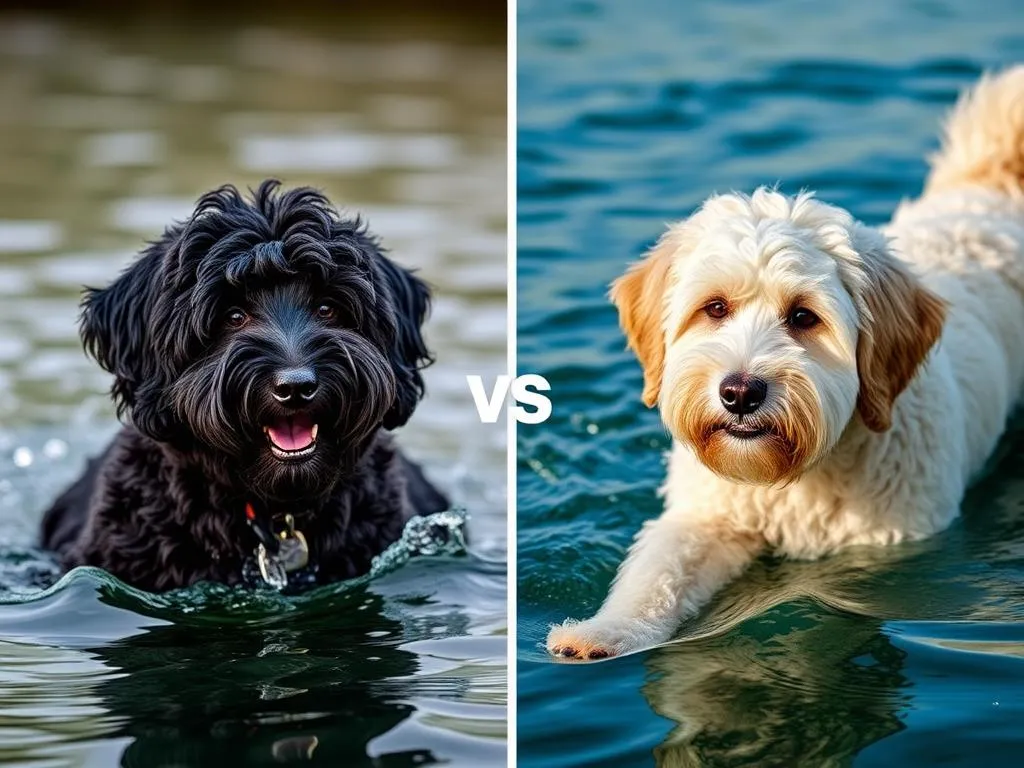
Introduction
In recent years, designer dog breeds have gained immense popularity among pet owners due to their appealing looks and temperamental traits. Among these, the Portuguese Water Dog and Goldendoodle stand out for their unique characteristics and friendly nature. When considering a new furry friend, it’s essential to compare these breeds in terms of characteristics, temperament, care needs, and suitability for different lifestyles. Choosing the right breed is crucial for ensuring a harmonious relationship between the dog and its owner.
Breed Overview
Portuguese Water Dog
History and Origin
The Portuguese Water Dog has a rich history that dates back centuries. Originating from the fishing communities of Portugal, these dogs were bred to assist fishermen by herding fish, retrieving lost gear, and acting as a water transport for messages. Their historical significance in maritime activities has made them an integral part of Portuguese culture.
Physical Characteristics
Portuguese Water Dogs are medium-sized, with the average weight ranging from 35 to 60 pounds. They possess a sturdy build with a distinctive coat that can be either curly or wavy. The coat is dense, providing insulation in cold waters. Color variations include black, white, brown, and combinations of these colors.
Temperament
Known for their intelligence and energetic nature, Portuguese Water Dogs are highly trainable and eager to please. They form strong bonds with their families and are generally good with children. Their playful demeanor makes them a great companion for active households.
Goldendoodle
History and Origin
The Goldendoodle is a relatively modern designer breed that emerged in the late 1990s. This breed results from crossbreeding Golden Retrievers with Poodles, aiming to combine the friendly disposition of the Golden Retriever with the hypoallergenic qualities of the Poodle. The breed was initially developed to serve as a guide dog for individuals with allergies.
Physical Characteristics
Goldendoodles come in various sizes—miniature, medium, and standard—depending on the size of the Poodle parent. Their weight can range from 15 to 90 pounds. The coat can be curly, wavy, or straight, and they typically exhibit a variety of colors, including cream, apricot, and chocolate.
Temperament
Goldendoodles are known for their friendly, social nature. They are highly affectionate and enjoy being around people. Their playful and adaptable disposition makes them suitable for families with children and other pets. Their intelligence also contributes to their trainability.
Comparison of Traits
Size and Weight
When comparing the average sizes and weights of both breeds, the Portuguese Water Dog tends to be more consistent in size, typically weighing between 35 to 60 pounds. In contrast, the Goldendoodle can vary significantly, with weights ranging from 15 to 90 pounds depending on the size of the Poodle parent. For potential owners, understanding these size differences is crucial, especially regarding living conditions. Larger breeds may require more space, while smaller varieties may adapt well to apartment living.
Coat and Grooming Needs
Both breeds possess unique coat types that require regular grooming. The Portuguese Water Dog has a dense, curly or wavy coat that is water-resistant. Grooming typically involves brushing at least once a week to prevent matting, along with professional grooming every 6 to 8 weeks.
On the other hand, Goldendoodles can have varying coat types—curly, wavy, or straight—each requiring different grooming levels. Curly-haired Goldendoodles need regular grooming to maintain their coat, while straight-haired ones may require less frequent grooming. Regular brushing is essential for all types, and owners should anticipate grooming costs ranging from $50 to $100 every few months.
Both breeds are known for their hypoallergenic properties, making them suitable for allergy sufferers. However, it’s important to note that no dog is entirely hypoallergenic, and potential owners should spend time with both breeds before making a decision.
Exercise and Energy Levels
Exercise is crucial for both the Portuguese Water Dog and Goldendoodle. The Portuguese Water Dog generally requires at least 60 minutes of exercise daily, which can include swimming, running, or playing fetch. Their strong swimming ability makes water-related activities particularly enjoyable for them.
Goldendoodles, depending on their size, also require substantial exercise—typically around 30 to 60 minutes daily. They enjoy walks, playtime in the yard, and socializing at dog parks. Both breeds adapt well to different living environments, but owners in urban settings need to ensure they provide enough physical and mental stimulation to keep their dogs happy.
Temperament and Behavior
In terms of personality, the Portuguese Water Dog is known for its intelligence and loyalty. They thrive on companionship and can become anxious if left alone for long periods. Their trainability is enhanced by their eagerness to please, making them excellent candidates for obedience training.
Conversely, Goldendoodles are exceptionally friendly and sociable, often welcoming new people and pets into their homes. Their intelligence also makes them highly trainable, but they require consistent reinforcement and socialization to develop well-rounded behavior.
Both breeds benefit from early socialization, which helps them adapt to new situations and environments. They are generally compatible with other pets, but early exposure to various animals is advisable for the best outcomes.
Health Considerations
Common Health Issues
Each breed has its specific health concerns. Portuguese Water Dogs are generally healthy but can be prone to certain conditions like hip dysplasia, progressive retinal atrophy (PRA), and certain skin disorders. Their average lifespan is around 12 to 14 years.
Goldendoodles, as a mixed breed, can inherit health issues from either parent. Common concerns include hip dysplasia, allergies, and certain types of cancer. Their lifespan typically ranges from 10 to 15 years, depending on their size and overall health.
Preventive Care
Both breeds benefit from regular veterinary check-ups to monitor their health and catch any potential issues early. Recommended health screenings include hip and eye exams for Portuguese Water Dogs and genetic testing for Goldendoodles to identify potential inherited conditions.
Preventive care, including proper vaccinations and parasite control, is essential to maintaining the health of both breeds. Regular dental care is also crucial, as dental disease can affect overall health.
Training and Socialization
Training Approaches
Effective training methods for both breeds emphasize positive reinforcement. Portuguese Water Dogs respond well to reward-based training, as their intelligence drives them to seek approval. Consistency and patience are key to their training success.
Goldendoodles also thrive on positive reinforcement and enjoy engaging training sessions. Their friendly nature often leads to a desire to please their owners, making them relatively easy to train. However, they may benefit from more structured training sessions, especially when it comes to managing their energy levels.
Socialization Needs
Early socialization is crucial for both breeds. Introducing puppies to various environments, people, and animals helps them develop into well-adjusted adults. For Portuguese Water Dogs, engaging in water activities can also provide unique socialization experiences, while Goldendoodles may enjoy playdates with other dogs.
Tips for socializing puppies include attending puppy classes, visiting dog parks, and inviting friends over. The more exposure they have, the better their adaptability will be in different situations.
Suitability for Different Lifestyles
Family Compatibility
Both the Portuguese Water Dog and Goldendoodle are excellent family dogs. The Portuguese Water Dog’s energetic nature makes them suitable for active families who enjoy outdoor activities, while the Goldendoodle’s friendly disposition allows them to interact well with children and other pets.
Considerations for families include each breed’s energy level and trainability. Families should assess their activity level and choose a breed that aligns with their lifestyle.
Living Conditions
When evaluating living conditions, both breeds can adapt to various environments, but certain factors should be considered. Portuguese Water Dogs thrive in active households with access to water, while Goldendoodles can adjust well to apartment living if they receive adequate exercise.
Space requirements may vary based on the dog’s size, with larger breeds needing more room to roam. Owners should consider their living arrangements and whether they can accommodate the dog’s exercise needs.
Time Commitment
Both breeds require significant time commitment daily. Owners should expect to invest time in exercise, grooming, and training. The Portuguese Water Dog may require more physical activity, while the Goldendoodle may demand more attention to socialization and training.
For busy families or individuals, it’s essential to evaluate whether they can meet these requirements. If time is limited, consider hiring a dog walker or enrolling the dog in daycare for socialization and exercise.
Cost of Ownership
Initial Purchase Price
The initial cost of acquiring a dog can vary significantly between the Portuguese Water Dog and Goldendoodle. Portuguese Water Dogs typically range from $1,500 to $3,000, depending on the breeder’s reputation and location. Goldendoodles, being a designer breed, can vary widely in price, with costs ranging from $1,000 to $5,000 based on their size and the breeder’s credentials.
Ongoing Care Costs
Ongoing care costs include food, grooming, and health care. Monthly expenses for both breeds can range from $100 to $300, depending on the dog’s size and dietary needs. Grooming costs may vary, with Portuguese Water Dogs typically costing around $50 to $100 every few months, while Goldendoodles may require more frequent grooming based on coat type.
Long-term considerations include expenses for training classes, pet insurance, and emergency veterinary care. Prospective owners should budget accordingly to ensure they can provide for their dog’s needs throughout its life.
Conclusion
In summary, both the Portuguese Water Dog and Goldendoodle offer unique characteristics that make them appealing choices for dog owners. The Portuguese Water Dog is a loyal, energetic breed with a rich history, while the Goldendoodle is a friendly, sociable designer breed known for its adaptability. Both breeds require significant time and care, making it essential for prospective dog owners to assess their lifestyles and preferences before deciding. Ultimately, choosing the right breed can lead to a fulfilling companionship that enhances the lives of both the dog and its owner.









